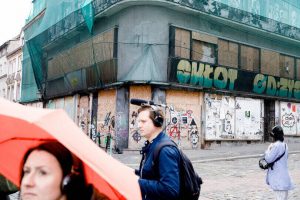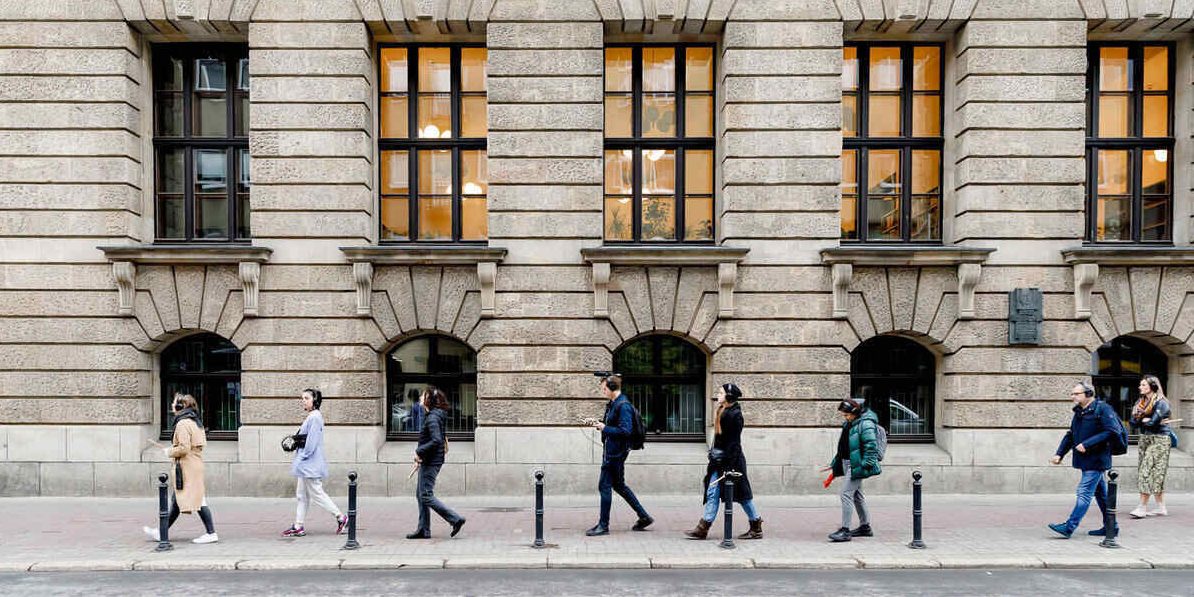Agata Siwiak, the art director of Close Strangers: East, is a firm believer in participatory theatre not as a temporary solution due to the pandemic, but as the future of performance. That Walk is an event put on by the male duo Pic Pic. For three months, Dmytro Levytskyi and Piotr Armianovskyi collected stories of women in Poznan that had suffered violence and felt comfortable enough to share their experiences. It explores the topics of rape, of brutality and of abortion, and situates each narrative in and around the streets of Poznan itself.
The style of performance is an immersive walk, guided by headsets worn by the group. This in itself presents a challenging metaphor – headphones, by their very nature, lock you into an isolated and single experience. Contrastingly, The Walk asks you to experience individualism alongside the collective by both walking alongside the fellow members and by listening to the layers of different narratives. The festival itself describes the experience as the ‘urban stage’ which is the perfect analogy, other than the distancing connotations of the ‘stage’. To me, the ‘stage’ implies a removal from reality whereas That Walk is the exact opposite – it fully immerses you in the realities and horrors of some of the things these women have faced.
As you walk around, the sounds of the street are picked up and played back to you through the headset. It takes a while to realise that some are staged and premeditated, but others are taken from the streets as you pass by. This helps situate the time and, most importantly, the era. I often found myself struggling to reconcile some of the tales I was hearing with my own life and political knowledge from here in the UK. However, when we standing in front of a building, the Odzysk, still erect in the centre of Poznan and covered in modern graffiti, this offered a stark reminder that this is the everyday and frequent struggle for women in Poznan today.

What is particularly clever about this experience is the link to culture and performance. There are moments where you pause beneath the type of statues many people would rush by without a second glance. One of these is dedicated to forgotten poets. The walk also begins at the theatre, with a discussion of its history and a head-on confrontation of its old ties to anti-Semitic performances. You are also given a traditional wooden instrument and asked to play this in Freedom Square as a marker of protest and solidarity with the women in the story.
Coming to the end of the event, I left with lots of unanswered questions and a need to understand more about the context of these stories. In discussion with Agata later that day, I learnt that there is very little support offered for women who are the victims of domestic abuse. Often, the man is merely cautioned and is almost never asked to leave the home they both live in. For rape and sexual offenses, abortion is not an option for many Polish woman and contraception is similarly hard to come by. Agata was telling me that a recent act running through the government is seeking to make it illegal to obtain the morning after pill. In the face of what can only be described as terror, it is the emergence of cultural acts such as this that give us hope. And, perhaps counter intuitively, I find most hope in the fact that That Walk was curated by two men seeking with no malice to honestly and empathetically give platform to these stories that must be shared.
This event was the most intimate way to learn about Poznan and to walk in the steps of its people, throughout the afternoon I viewed the streets I’d be walking around for the weekend in a completely different light. You notice the shadows and the darkness, but also the light from within that comes from the sharing of such experiences. Therefore, whilst horrifying in many ways, I have to extend my gratitude to Pic Pic and for the women in the stories for sharing their experiences with me.

